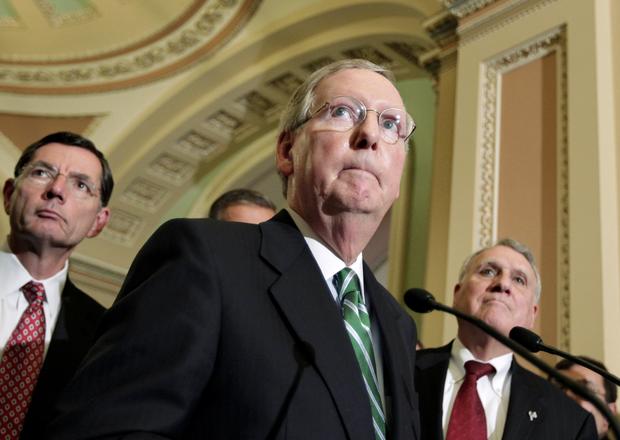McConnell: GOP working on alternate proposal for payroll tax cut extension
Senate Republican Leader Mitch McConnell said Tuesday that Republicans are working on an alternate proposal for extending the payroll tax cut, and predicted that, at the end of the day, "the House will insist that as we extend this payroll tax relief for individuals only for another year."
McConnell, speaking to reporters at a press availability, declined to provide details of the Republican bill, other than to say it would "be paid for in an acceptable way that does not adversely impact job creation."
"In all likelihood, we will agree to continue the current payroll tax relief for another year, but we believe that it should be paid for," the Kentucky Republican told reporters. "Senate Republicans will offer an alternative that would pay for it. I believe House Republicans later will produce a similar bill that is paid for. And at the end of the day, I think the House will insist that as we extend this payroll tax relief for individuals only for another year, that it be paid for in an acceptable way that does not adversely impact job creation at a time when we are either in a recession or look very much like we're in a recession."
President Obama is urging Congress to pass a bill extending the payroll tax cut, and the White House has repeatedly warned that failing to do so will cause families making $50,000 per year to see a tax hike of $1,000.
Senate Democrats have said they plan to schedule a vote this weekon a bill that would extend the tax cut - which they propose paying for through a 3.25 percent tax on income in excess of $1 million.
The Democratic bill is not expected to gain traction in the House, however, because Republicans object to the inclusion of the tax increase - which Republicans target as a political tactic. They also argue that the revenue hikes would hit small businesses.
"Republicans have said that extending the payroll tax break is a potential area of common ground, but coupling it with a job-killing tax hike on small businesses makes no sense whatsoever. It looks like Washington Democrats are playing politics with American jobs - again," said Michael Steel, spokesman for House Speaker John Boehner, in a statement to Hotsheet on Tuesday.
Senate Democrats, on the other hand, contend that the bill cuts the payroll tax in half for 98 percent of small businesses, and point to findings that the bill could create more than 50,000 jobs per month.
McConnell said Tuesday that it was necessary to pay for the tax cuts because "with this $15 trillion debt we now have, bigger than our economy, we need to be paying for a measure like this that's temporary."
"I think in the end we will pay for it," he said.
When asked what the pay-for would be, McConnell told reporters "we'll let you know," but noted that the vote would be later this week.
In a press briefing on Tuesday, Alan Krueger, chairman of the President's Council of Economic Advisers, said that failing to pass a bill extending the payroll tax cut would be a "drag on economic growth" - though he stopped short of explicitly arguing that it would push the U.S. into another recession.
"What I can say from looking at the evidence is that this is the medicine that we can use in the near term to help strengthen the recovery and to help to provide insurance against shocks that might be coming," Krueger said.
He also disputed the argument, put forth in a report by the nonpartisan congressional Joint Tax Committee, that about a third of small businesses would be taxed additionally given a tax hike on incomes over $1 million a year.
"The tax on incomes above $1 million a year, I think, would hit very few small businesses," Krueger said. "The vast majority -- one figure I saw was 99 percent of -- of individuals with small business income would not be affected by this. So the vast majority of employers would be -- would be unaffected by what was proposed to... pay for the payroll tax extension."
According to Washington Post blogger Suzy Khimm, the millionaire's tax "would indeed affect about 30 to 40 percent of business income that's reported on individual tax returns, rather than on corporate tax returns."

